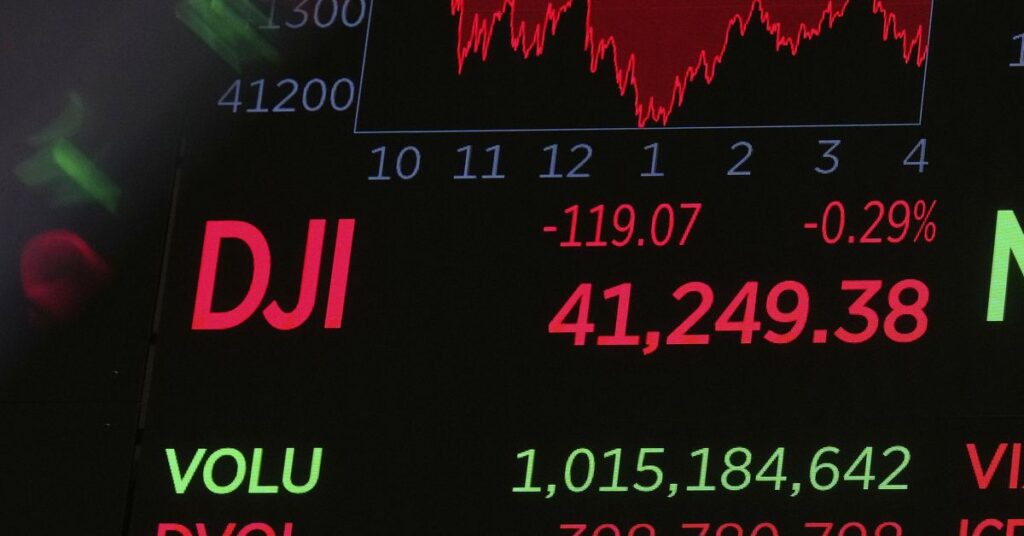
US stocks experienced a significant downturn overnight as President Donald Trump announced a series of new tariffs targeting countries such as Japan, South Korea, and South Africa. The announcement led to a sharp decline in major indexes, with the Dow closing 422 points, or 0.94 percent, lower. The S&P 500 fell by 0.79 percent, and the tech-heavy Nasdaq Composite dropped by 0.92 percent, marking the worst day for these indexes in about three weeks.
The market turmoil began midday when Trump declared a 25 percent tariff on Japan and South Korea, set to be implemented on August 1. The situation worsened in the afternoon as additional tariffs ranging from 25 percent to 40 percent were announced on countries including Myanmar, Malaysia, Kazakhstan, Laos, and South Africa.
Impact on Global Markets
The ripple effect of Trump’s tariff announcements was felt across global markets. US-listed shares of major Japanese automakers such as Toyota, Nissan, and Honda saw declines of four percent, 7.16 percent, and 3.86 percent, respectively. Similarly, South Korean technology giants LG Display and SK Telecom experienced drops of 8.3 percent and 7.76 percent, respectively.
Exchange-traded funds (ETFs) managed by BlackRock, which track stocks in Japan, South Korea, South Africa, and Malaysia, also suffered, with declines of 2.4 percent, 3.56 percent, 1.73 percent, and 1.97 percent, respectively. These ETFs posted their worst performance since early April.
Market Reactions and Economic Indicators
According to Ross Mayfield, an investment strategist at Baird, the unexpectedly high tariff rates prompted a sell-off in stocks. The US government bonds also reacted, with the 10-year Treasury yield rising to 4.39 percent and the 30-year yield increasing to 4.92 percent, as yields and prices typically move in opposite directions.
The US dollar index, which measures the dollar’s strength against six major foreign currencies, gained 0.3 percent. Meanwhile, the Japanese yen, South Korean won, and South African rand weakened against the dollar. Wall Street’s fear gauge, the CBOE Volatility Index, saw an 8.4 percent increase, indicating heightened market anxiety. Gold prices fluctuated, dipping in the morning before gaining 0.1 percent later in the day.
Strategic Perspectives
While some investors remain optimistic, others express caution. Scott Wren, a global market strategist at Wells Fargo Investment Institute, warned that the market’s current optimism regarding tariff resolutions might be misplaced. He suggested that as tariff rates stabilize, there could be an economic slowdown and a pullback in consumer spending.
Wren’s concerns are echoed by Jim Baird, chief investment officer at Plante Moran Financial Advisors, who noted the fluid nature of the situation, emphasizing that changes can occur with little notice.
Future Implications and Market Outlook
As the market digests these developments, investors are closely monitoring any further announcements regarding tariff rates. Lukman Otunuga, a senior market analyst at FXTM, highlighted that if tariffs rise beyond expectations, it could revive recession fears and trade uncertainty, potentially leading to a further decline in stocks while safe-haven assets rally.
Despite recent record highs for the S&P 500 and Nasdaq, the Dow remains approximately 608 points away from its all-time high. The coming weeks are expected to be crucial, with investors looking for clarity on trade deals and any additional tariff measures.
In the broader context, Trump’s tariffs are part of a larger strategy to renegotiate trade terms with key partners. As the August 1 deadline approaches, the stakes are high for both the US and its trading partners, with potential implications for global economic stability.





